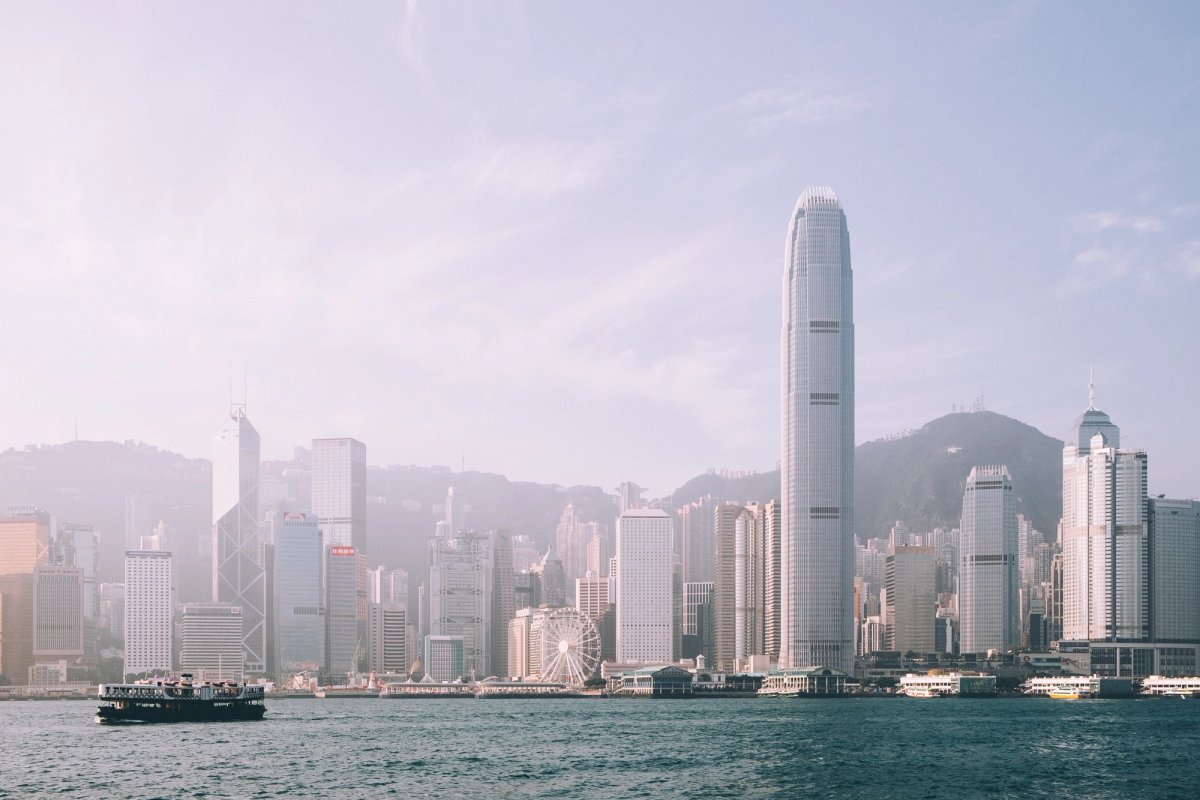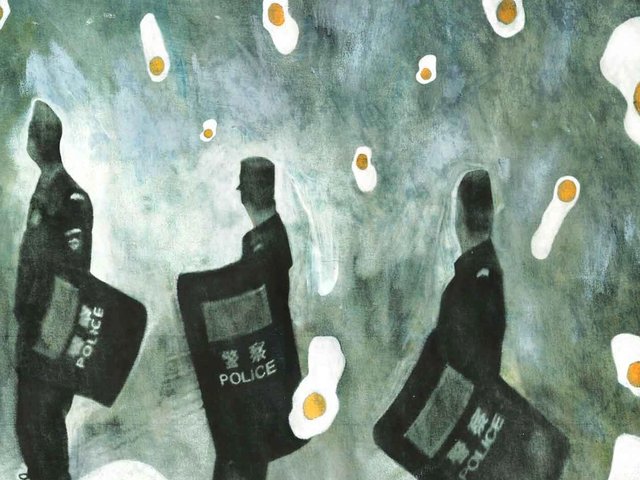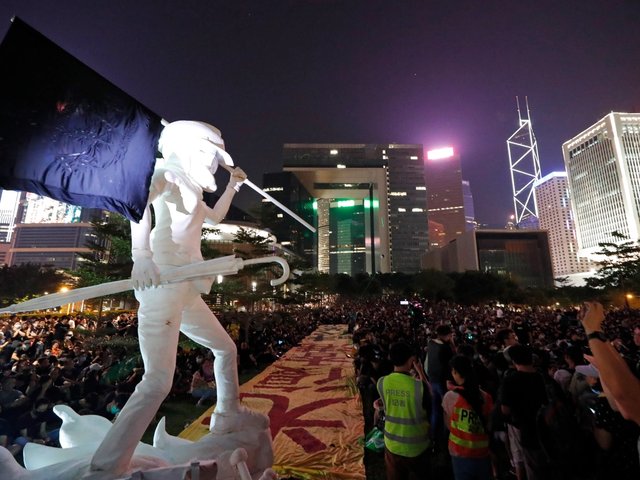A number of artists in Hong Kong are making plans to leave the city, fearing that the newly enacted national security law will restrict freedom of expression and increase self-censorship. But some have vowed to stay, believing that more sophisticated works will emerge against the backdrop of an uncertain future.
The national security law came into effect in Hong Kong at 11pm on 30 June, on the eve of the 23rd anniversary of the former British colony's sovereignty handover to China. The law criminalises acts of secession, subversion of the state, terrorism and collusion with foreign forces. Offenders could be jailed for life. It was drafted by Beijing, bypassing Hong Kong’s legislature.
The Hong Kong government stressed that freedom of expression was well-protected under the Basic Law (the Special Administrative Region's mini-constitution), and that the national security law only applied to “a tiny number of cases”.
However, after the law came into effect, the government said that people chanting or possessing items displaying a certain slogan could be arrested. Public libraries have also purged books written by prominent activists, citing the need to review whether the titles breached the new law. Over a thousand members of Hong Kong’s arts community signed a petition last month to oppose the passing of the law.
Hong Kong's police has also been granted new powers, with officers now able to conduct searches of premises without a court warrant. A new mainland agency overseeing national security in Hong Kong has been set up and operates outside of the city’s legal system. The new rules even apply to offences committed from outside Hong Kong by a non-Hong Kong resident as China claims extraterritoriality via the law.
The enactment of the law has sparked a strong international reaction. US State Secretary Mike Pompeo called the law "draconian" on his Twitter on Tuesday. But Hong Kong's chief executive Carrie Lam said on the same day that the new law will restore stability and the new implementation rules were drafted to protect and respect human rights. She also rejected claims of how the new law has caused widespread fear among citizens.
The ramifications of the law have led some citizens to scrub their social media accounts or delete them entirely. Many have also switched to the secure messaging app Signal, downloads of which topped Hong Kong’s Android Play Store over the weekend.
“The law has created massive panic for the general public,” says the artist Kacey Wong, who is known for his political works. “The fear is real, imminent almost. The question is, against such a backdrop, how can art operate?”
The government is a major sponsor of the arts, so questions have been raised over the ability of art professionals working at government-run or backed institutions to maintain their professionalism and integrity under the new law. Public museums in Hong Kong include M+, the visual culture museum due to open in West Kowloon Cultural District and the Jockey Club-backed heritage and cultural centre Tai Kwun.
“Today it can be the [protest slogan]. Tomorrow it can be books, or the colour of your shirt. Anything can be deemed anti-state materials and there is no way you can defend yourself,” Wong says.
Chris Chan Kam-shing, an artist and chairman of the visual arts group in the Hong Kong Arts Development Council, says the law is "scarier than expected". He says Hong Kong’s greatest strength lies in the city’s freedom and tolerance of differences, but under the new law, it appears that only one voice can live. “I can’t see the future if they do this,” he says.
Chan says some members of the council have raised concerns over the government-funded arts body. Some artists, just like many Hong Kong people, are exploring plans to leave the city, especially after British Prime Minister Boris Johnson vowed to grant three million Hongkongers a pathway to British citizenship. Some other artists The Art Newspaper has spoken to anonymously also said that they have been considering their options to leave. But Chan says he has no plans to leave the city.
A Hong Kong-based illustrator says she will be relocating to Taiwan next month. She applied for a residency permit on the self-governed island last year while the pro-democracy protests were at their peak. She always liked Taiwan and intended to retire there, she says, but never anticipated that the move would arrive so soon.
“My work has nothing to do with politics but given the circumstances under this law, it is very difficult to continue to do creative work,” she says.
But some are more hopeful, suggesting that the tighter rules could elicit greater creativity and give rise to more sophisticated, coded works of art in years to come.
People have been very creative with the slogans to avoid getting in trouble with the government, the activist says. At protest sites, some chanted Cantonese words that rhyme with the slogan that has been deemed subversive by the government. Designs for protest banners containing the rally slogan have been reinvented with abstract graphic design. Some people also held sheets of blank white paper instead of signages at protests. Netizens, meanwhile, rewrote the lyrics of the protest anthem Glory to Hong Kong with numeric digits instead of words. The government banned the anthem from schools today as it is considered politically dangerous while the new national security office headquarters is set up in the city.
The creative explosion that Hong Kong has witnessed since the 2014 pro-democracy Umbrella Movement and the ongoing protests will continue to develop, many believe. “People will continue to say what they want to say, but in a more indirect, abstract way. The works we shall see will be more loaded, coded and full of symbolism. People will rearrange the algorithm of art shapes and symbols to resist this kind of crackdown,” says Wong, who has no plans to leave Hong Kong for now.
The Hong Kong-based artist Elizabeth Briel, who runs an artist residency and project space called Creative Kowloon, says she intends to maintain a permanent presence in the city despite the passing of the law. She says that over the six years she lived in the city, she witnessed an explosion of creativity, and the building of arts and cultural infrastructure has also made the city exciting.
“Hong Kong seemed to be valuing art and creativity more. People here are talking about who we are and what matters to us. This is the city where I want to stay and be a witness,” she says.





